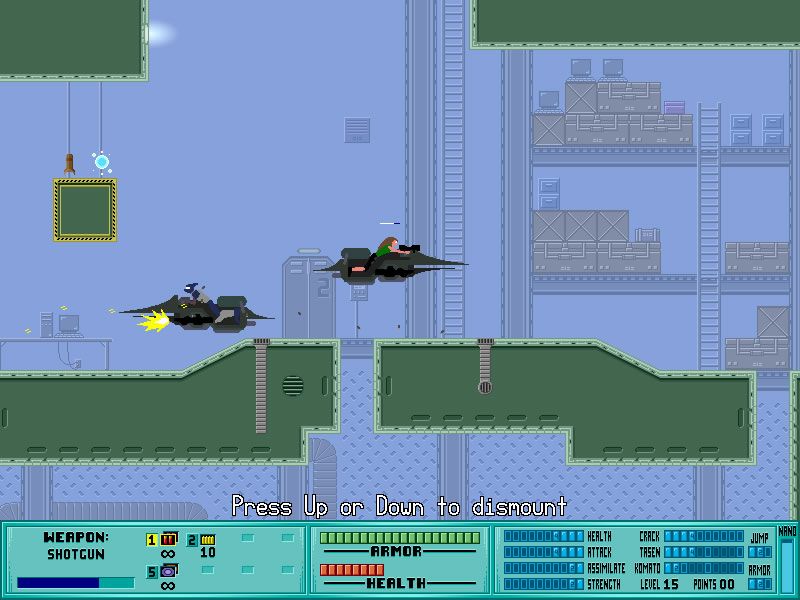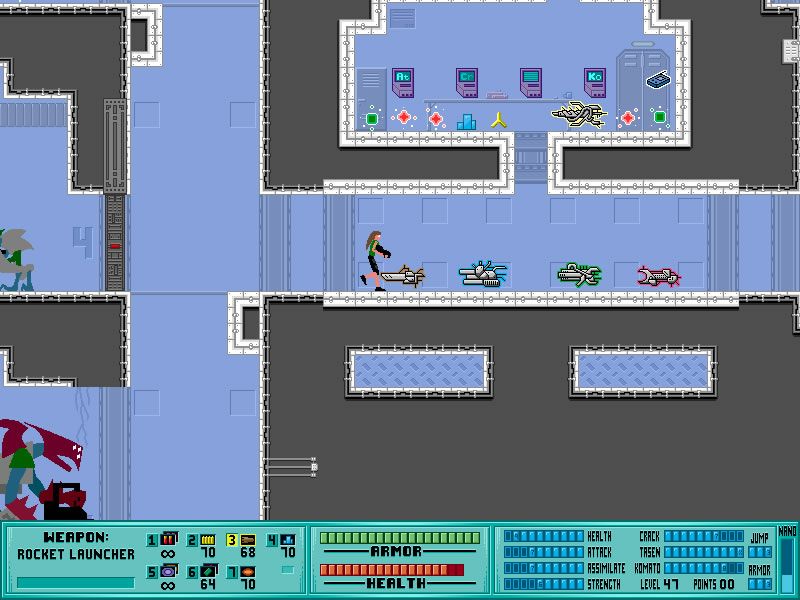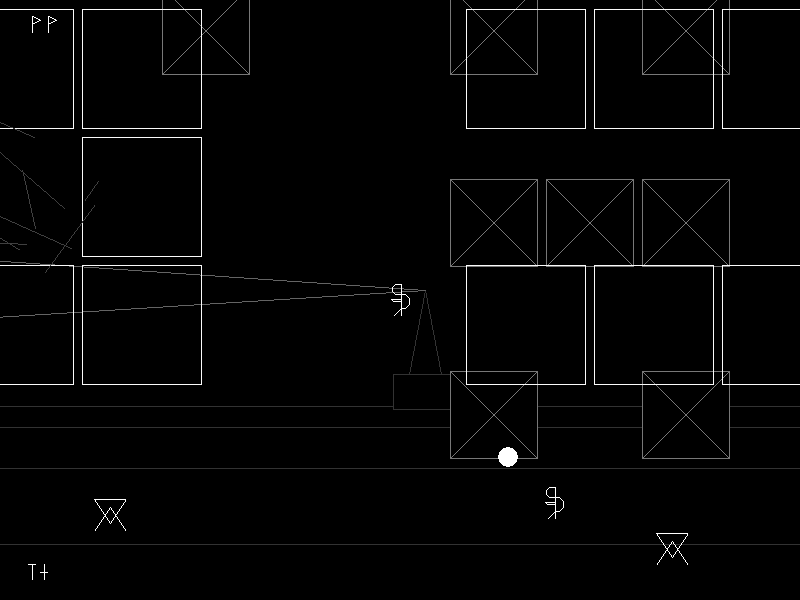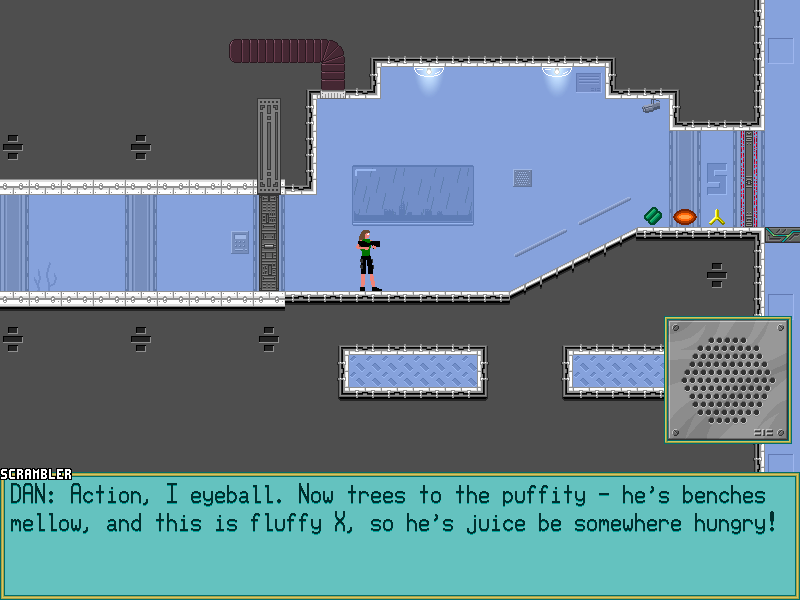Retro Replay Review
Gameplay
Iji delivers a seamless blend of classic side-scrolling action and deep role-playing mechanics. From the outset, you guide Iji through ten distinct sectors of a sprawling military complex, each filled with hidden pathways, challenging enemies and interactive consoles. Movement feels responsive—jumping, climbing and crouching come naturally, ensuring that both veteran platformer fans and newcomers feel at home. Exploration is richly rewarded: every corner may yield ammo, upgrade or lore entry.
(HEY YOU!! We hope you enjoy! We try not to run ads. So basically, this is a very expensive hobby running this site. Please consider joining us for updates, forums, and more. Network w/ us to make some cash or friends while retro gaming, and you can win some free retro games for posting. Okay, carry on 👍)
Combat evolves organically as you collect new weapon parts and nanotech upgrades. Starting with a simple shotgun and a powerful kick, Iji soon gains access to machineguns, rocket launchers and experimental weapons like the resonance detonator. At special fusion stations, you can combine two weapons into a hybrid armament, encouraging experimentation and strategic load-outs. Ammo scarcity and weapon variety ensure that every encounter remains tense and engaging—will you conserve shells for tougher foes or go all-out with rapid fire?
RPG elements add meaningful choices to the action. Iji’s seven upgradeable skills span health, strength, hacking and even alien affinities (Tasen vs. Komato). Progress is earned through orbs dropped by defeated foes, but each sector caps your upgrades, forcing thoughtful allocation. Do you max out Assimilate to bypass barriers and terrorize mechanical foes? Or invest in Strength to blast through locked doors and crush enemies in melee? These skills not only shape your combat prowess but also influence narrative outcomes, giving replay value beyond mere level mastery.
Puzzle-like segments and optional vehicle sections break up the shooting. Operating consoles to open locked doors, disabling security in mini-games and navigating hover-vehicle “Shredders” add variety and keep momentum high. Four difficulty levels cater to all skill sets, and multiple endings unlock extras—from mini-games to new costumes—rewarding thorough exploration and varied playstyles.
Graphics
Despite its indie origins, Iji’s pixel art aesthetic remains remarkably polished. Environments are richly detailed—from claustrophobic laboratories strewn with debris to stark alien corridors alive with bioluminescent flora. Color palettes shift subtly between sectors, reinforcing mood changes as you delve deeper into the ruins. Each background layer scrolls smoothly, creating a sense of depth uncommon in many free-to-play platformers.
Character and enemy designs strike a fine balance between simplicity and expressiveness. Iji herself moves fluidly across the screen, her animations for jumping, climbing and shooting conveyed with minimal but effective frames. Alien foes—the ruthless Tasen and their Komato rivals—boast distinct silhouettes and attack patterns. Boss encounters, in particular, showcase larger sprites with multi-stage transformations, turning graphic limitations into a canvas for creative animation.
Special effects are used sparingly but impactfully. Explosions, muzzle flashes and nanotech abilities glow brightly against darker backdrops, drawing your attention to critical action. Fusion station animations elegantly convey the merging of weapon parts, and cutscenes—rendered in the same in-engine style—use camera pans and text boxes to accentuate pivotal story beats. While not pushing hardware limits, Iji’s graphics serve the gameplay and narrative brilliantly.
Story
The narrative thrust of Iji is deceptively simple yet grows in depth with every logbook entry and intercom transmission. You wake from a months-long stasis to discover your world shattered by an Alpha Strike from the alien Tasen race. Nanotech augments have transformed you into humanity’s last hope, while your brother Dan guides you remotely, offering emotional support and dry humor amid the carnage. This personal connection elevates every mission—failure carries more emotional weight when Dan’s voice crackles over the comms.
As you hunt down the Tasen leadership, you encounter the Komato—another alien faction whose motives aren’t immediately clear. Through in-game conversations, data logs and environmental storytelling, layers of political intrigue and moral ambiguity emerge. Iji’s actions—killing every Tasen or sparing certain key figures—alter subsequent dialogue and mission objectives. Though there are no explicit dialogue choices, your behavior paints Iji as a warrior, diplomat or reluctant assassin, culminating in multiple possible endings that reflect your ethical stance.
Cutscenes are concise but impactful, punctuated by haunting soundscapes and minimalist character portraits. Dan’s intermittent announcements and admonitions provide narrative beats between sectors, while encrypted logbooks reveal the Tasen’s history and Komato politics. This multi-layered approach rewards careful readers, as each new entry sheds light on the larger conflict and your place within it. By the final confrontation, Iji’s journey feels both personal and galaxy-shaking—a rare feat for a freeware title.
Overall Experience
Iji stands out as an exemplar of indie ingenuity. Its tight gameplay, meaningful upgrade system and branching storylines create an experience that feels far more substantial than its modest download size suggests. There’s a palpable sense of progression as you master new weapons, hack deeper into alien systems and uncover hidden lore. Every decision—be it a skill upgrade or a choice to spare an enemy—carries weight.
The balance between action and narrative is finely tuned. Combat encounters demand attention, with scarce resources forcing tactical play. Between firefights, exploration and dialogue sequences offer quiet breathing room to absorb the stakes and adapt your strategy. This rhythm, combined with unlockable extras and multiple endings, delivers high replay value.
For fans of platformers, RPGs or story-driven adventures, Iji offers a compelling package that belies its freeware status. Its pixel art world is brimming with atmosphere, its arsenal transforms gameplay in satisfying ways, and its narrative choices challenge your moral compass. Whether you’re in it for a first playthrough or eager to experiment with alternative builds and outcomes, Iji remains a must-play classic in the indie gaming canon.
 Retro Replay Retro Replay gaming reviews, news, emulation, geek stuff and more!
Retro Replay Retro Replay gaming reviews, news, emulation, geek stuff and more!









Reviews
There are no reviews yet.